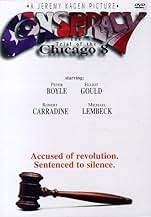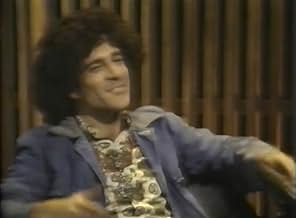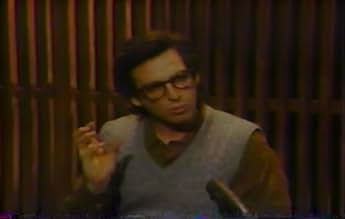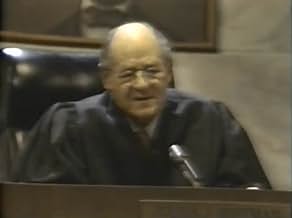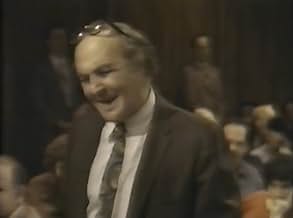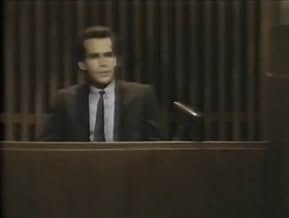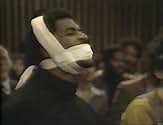AVALIAÇÃO DA IMDb
7,2/10
274
SUA AVALIAÇÃO
Adicionar um enredo no seu idiomaA dramatized historical recreation of the Chicago Conspiracy trial with present testimonies by many of the participants.A dramatized historical recreation of the Chicago Conspiracy trial with present testimonies by many of the participants.A dramatized historical recreation of the Chicago Conspiracy trial with present testimonies by many of the participants.
- Direção
- Roteirista
- Artistas
- Prêmios
- 1 vitória e 2 indicações no total
Avaliações em destaque
Some years down the road I wrote about a similar project released on the 2000's about the Chicago 8 and how I wasn't so impressed by it due to its insistence
on presenting the whole truth inside the maddening trial that convicted peaceful protesters on the Democratic National Committee in Chicago. I wrote in the other
film review that I liked the film but also that I'd wait for the highly publicized version of Spielberg that was announced back then. Well, that version is in the
development hell and I guess we're all gonna have to wait for a feature film of the infamous trial. As for this project here, despite a stellar cast with the likes of
Robert Loggia, David Clennon, Peter Boyle and Elliott Gould, I simply couldn't believe my eyes and ears simply because the makers of it managed to deliver a weaker film,
excrutiangly amateur-ish and unsastisfying all along.
Lots of viewers praise the film because the real-life figures (such as Abbie Hoffman, Bobby Seale, David Dellinger and others) all appear to present their versions of the trial at the same time the director freeze-frame or cuts to present the actors playing the roles in this filmed theatre of a movie. I'd be fine with such device had director Jeremy Kagan not make such an ugly and dated collage of images mixing actors and the real key figures of the trial. It all looks like a cheap video clip of the 1980's, all messy and with one face over-imposing the other. And when Hoffman appears there were times I wasn't sharing his sense of humor or getting why he's being so funny about the whole thing (he is presented as a larger than life humored guy, as evidenced by all the transcripts of the trial). Had Mr. Kagan used of the scheme presented by Warren Beatty in "Reds" where he showed interviews with the historic witnesses of events and then jumped to the movie then we'd benefit more with it.
Again, it's amateur-ish at its worse. Just because the real trial case was amateur thanks to a lousy judge and the truth facts must be shown it all doesn't mean a film made for such curious audiences should be equaled to such amateur-ish craftsmanship. I liked the idea of not showing the jury, instead the actors look at the camera, break the fourth wall to us and suddenly we are the jury. And once we're in the jury and see what goes down inside court, watch the defendants, the witnesses and the undercover people attacking the defendants, that's when the movie gets interesting. For those who know the story, you know the drill that you're going to see a lunatic judge overruling every objection made by the Chicago eight; the government gets everything easily done; and Bobby Seale is all for wanting his constitutional rights preserved to the point of receiving a gag from court - that part was too repetitive, it's like half an hour goes by with just him asking for his rights. Basically, my thoughts were: give me the truth but I don't need 100% of it because there'll always be artistic licences and by creating a nauseating scenario that keeps repeating itself over and over, not going anywhere, we're all gone lose it.
The film has good performances by the cast - highlights to the lawyer played by Robert Loggia, who steals the show with memorable and important speeches about law, going after the judge and the actor seemed to be having fun all around and that's nice; Boyle is also great just as Barry Miller; Ron Rifkin as Allen Ginsberg seems a little off-mark but saves when its time to showcase the poet's work on court. All the actors playing the fighters against the system captured the essence of the period, counterculture of the 1960's, much of what needs to come to surface these days of social/political tyranny. There are brave performances in this movie, almost inspiring but the film gags with a bureaucratic script, square direction and lack of a better development. It's not entirely a waste, there are plenty of accuracies and fine acting, but the experience doesn't satisfy as a whole.
I'm still waiting for a new take coming from Hollywood, a theatrical release on a subject that needs to be explored more and to wider audiences. It's perfect for the times but in a way it's all about timeless topics. The freedom to protest your government, freedom of thinking and expression. 5/10
P. S.: the Spielberg version was released actually done by Aaron Sorkin "The Chicago 7", nominated for several Oscars and winner of Best Ensemble at the SAG awards, and it turned out to be the best film about the subject. It was worth the wait.
Lots of viewers praise the film because the real-life figures (such as Abbie Hoffman, Bobby Seale, David Dellinger and others) all appear to present their versions of the trial at the same time the director freeze-frame or cuts to present the actors playing the roles in this filmed theatre of a movie. I'd be fine with such device had director Jeremy Kagan not make such an ugly and dated collage of images mixing actors and the real key figures of the trial. It all looks like a cheap video clip of the 1980's, all messy and with one face over-imposing the other. And when Hoffman appears there were times I wasn't sharing his sense of humor or getting why he's being so funny about the whole thing (he is presented as a larger than life humored guy, as evidenced by all the transcripts of the trial). Had Mr. Kagan used of the scheme presented by Warren Beatty in "Reds" where he showed interviews with the historic witnesses of events and then jumped to the movie then we'd benefit more with it.
Again, it's amateur-ish at its worse. Just because the real trial case was amateur thanks to a lousy judge and the truth facts must be shown it all doesn't mean a film made for such curious audiences should be equaled to such amateur-ish craftsmanship. I liked the idea of not showing the jury, instead the actors look at the camera, break the fourth wall to us and suddenly we are the jury. And once we're in the jury and see what goes down inside court, watch the defendants, the witnesses and the undercover people attacking the defendants, that's when the movie gets interesting. For those who know the story, you know the drill that you're going to see a lunatic judge overruling every objection made by the Chicago eight; the government gets everything easily done; and Bobby Seale is all for wanting his constitutional rights preserved to the point of receiving a gag from court - that part was too repetitive, it's like half an hour goes by with just him asking for his rights. Basically, my thoughts were: give me the truth but I don't need 100% of it because there'll always be artistic licences and by creating a nauseating scenario that keeps repeating itself over and over, not going anywhere, we're all gone lose it.
The film has good performances by the cast - highlights to the lawyer played by Robert Loggia, who steals the show with memorable and important speeches about law, going after the judge and the actor seemed to be having fun all around and that's nice; Boyle is also great just as Barry Miller; Ron Rifkin as Allen Ginsberg seems a little off-mark but saves when its time to showcase the poet's work on court. All the actors playing the fighters against the system captured the essence of the period, counterculture of the 1960's, much of what needs to come to surface these days of social/political tyranny. There are brave performances in this movie, almost inspiring but the film gags with a bureaucratic script, square direction and lack of a better development. It's not entirely a waste, there are plenty of accuracies and fine acting, but the experience doesn't satisfy as a whole.
I'm still waiting for a new take coming from Hollywood, a theatrical release on a subject that needs to be explored more and to wider audiences. It's perfect for the times but in a way it's all about timeless topics. The freedom to protest your government, freedom of thinking and expression. 5/10
P. S.: the Spielberg version was released actually done by Aaron Sorkin "The Chicago 7", nominated for several Oscars and winner of Best Ensemble at the SAG awards, and it turned out to be the best film about the subject. It was worth the wait.
10delbruk
This is an innovative, historical, and very well acted account of the US Government's attempt to put a generation of anti-war protestors on trial. From a political standpoint this film succeeds in outlining the key issues protestors had against the Vietnam War. From a legal standpoint this film succeeds in defining what may have been the most unorthodox and legally flawed trial ever to take place in America. On the artistic side, this film combines fantastic actors who embody the spirit of the true life defendants as well as offering intertwined detailed accounts from the participants themselves.
In respect to the reviewer who stated this wasn't what he remembered, I can only say that media accounts usually do not cover events accurately and that this whole docudrama is taken from the actual court transcripts. As someone who has taught and studied this trial and accounts, I assure you will not find better.
For an understanding of what divided and still splinters our country, this truly is required viewing.
In respect to the reviewer who stated this wasn't what he remembered, I can only say that media accounts usually do not cover events accurately and that this whole docudrama is taken from the actual court transcripts. As someone who has taught and studied this trial and accounts, I assure you will not find better.
For an understanding of what divided and still splinters our country, this truly is required viewing.
I watched this on YouTube the day after I saw The Trial of the Chicago 7, and whilst I liked the latter, I was impressed by the drama/documentary style of Conspiracy, and the fact that it was based on court records and interviews with all of the defendants and the three main defending lawyers who were alive at the time.
Comparing the two casts, I can't fault the actors, but in this one as William Kunstler Robert Loggia has an edge on Mark Rylance, and David Opatashu as Julius Hoffman has an edge on Frank Langella.
If you haven't seen either, I suggest you watch this one first to get more of the truth about a shameful period of American justice.
Anne Kerr (I925 - 1973), Labour MP for Rochester and Chatham from 1964 - 1970, is portrayed in a small part by an uncredited Carolyn Seymour. Kerr died of acute alcoholic poisoning, and at her inquest, her husband Russell Kerr (also a Labour MP), said that she had never really recovered from being beaten by police at Chicago five years earlier.
Comparing the two casts, I can't fault the actors, but in this one as William Kunstler Robert Loggia has an edge on Mark Rylance, and David Opatashu as Julius Hoffman has an edge on Frank Langella.
If you haven't seen either, I suggest you watch this one first to get more of the truth about a shameful period of American justice.
Anne Kerr (I925 - 1973), Labour MP for Rochester and Chatham from 1964 - 1970, is portrayed in a small part by an uncredited Carolyn Seymour. Kerr died of acute alcoholic poisoning, and at her inquest, her husband Russell Kerr (also a Labour MP), said that she had never really recovered from being beaten by police at Chicago five years earlier.
Spectacular docudrama that highlights one of the most famous trials of the 20th century. The usage of the split screen and seeing the real defendants commenting on the trial as the actors are playing their parts is so innovative and amazing. The real Abbie Hoffman is as always so entertaining and a larger than life figure. So sad to know he killed himself a few years after he was filmed for this movie. Also the use of real stock footage is interspersed throughout and adds a layer of reality and mounting tension during the trial. Tremendous performances led by David Opatashu as the judge and a terrific cast of riveting actors makes this a must see television movie.
This is a docudrama about the trial of the Chicago 7. I earlier reviewed the recent 2020 Netflix film by Aaron Sorkin called "The Trial of the Chicago 7." The 1987 film has the advantage of including brief interviews with each of the defendants and the two defense lawyers. Both lawyers and at least three of the defendants were dead by the time of the 2020 film.
The unique characteristics of the 1987 film were that it takes place solely within the courtroom using language from the trial transcripts. The setting is that the viewer is in the position of a jury member; on numerous occasions, the lawyers speak directly into the camera. In the background on occasion, clips are shown from actual footage taken on the streets of Chicago and inside the convention hall. Bobby Seale (Carl Lumbly) has the highest profile in the film as his demand for recognition of his constitutional rights receives major play. David Dellinger (Peter Boyle) has a much larger role than in the Netflix film, as does Rennie Davis (Robert Carradine). Davis is a much stronger character than portrayed in the Netflix production.
Abbie Hoffman (Michael Lembeck) and Jerry Rubin (Barry Miller) play the Yippie roles well, though Abbie Hoffman has slightly less profile in this film. William Kunstler (Robert Loggia) is well-played; Leonard Weinglass (Elliott Gould), who is almost invisible in the Netflix production, has a significant profile in this one. The prosecutors, Richard Schultz (David Clennon) and Tom Foran (Harris Yulin), are even less sympathetic in the HBO film. Judge Hoffman (David Opatoshu) plays his biases very well.
In my mind, today's film from 1987 was superior to the 2020 Netflix film. I think some scenes are more memorable, especially the Bobby Seale-Judge Hoffman exchanges. Martin Sheen has a minuscule role as a businessman who witnessed some police bad behavior. Allen Ginsburg (Ron Rifkin) recites some of his poetry and does some om chanting to both the prosecutors and Judge Hoffman's dismay.
It's a good history lesson; I recommend it.
The unique characteristics of the 1987 film were that it takes place solely within the courtroom using language from the trial transcripts. The setting is that the viewer is in the position of a jury member; on numerous occasions, the lawyers speak directly into the camera. In the background on occasion, clips are shown from actual footage taken on the streets of Chicago and inside the convention hall. Bobby Seale (Carl Lumbly) has the highest profile in the film as his demand for recognition of his constitutional rights receives major play. David Dellinger (Peter Boyle) has a much larger role than in the Netflix film, as does Rennie Davis (Robert Carradine). Davis is a much stronger character than portrayed in the Netflix production.
Abbie Hoffman (Michael Lembeck) and Jerry Rubin (Barry Miller) play the Yippie roles well, though Abbie Hoffman has slightly less profile in this film. William Kunstler (Robert Loggia) is well-played; Leonard Weinglass (Elliott Gould), who is almost invisible in the Netflix production, has a significant profile in this one. The prosecutors, Richard Schultz (David Clennon) and Tom Foran (Harris Yulin), are even less sympathetic in the HBO film. Judge Hoffman (David Opatoshu) plays his biases very well.
In my mind, today's film from 1987 was superior to the 2020 Netflix film. I think some scenes are more memorable, especially the Bobby Seale-Judge Hoffman exchanges. Martin Sheen has a minuscule role as a businessman who witnessed some police bad behavior. Allen Ginsburg (Ron Rifkin) recites some of his poetry and does some om chanting to both the prosecutors and Judge Hoffman's dismay.
It's a good history lesson; I recommend it.
Você sabia?
- CuriosidadesThe screenplay was derived entirely from the transcript of the real "Chicago 8" trial. A message appears before the opening credits that reads "Everything you are about to see and hear actually happened."
- Erros de gravaçãoThe famous quote by Abbie Hoffman "You are a disgrace in front of the gentile - of which he said in Hebrew - does not appear in the movie.
- Citações
Jerry Rubin: I like being in here. It's very interesting.
Judge Julius Hoffman: That's the best statement I've heard here during this trial. You said you enjoy being in here?
Jerry Rubin: Sure. It's good theatre.
- Cenas durante ou pós-créditosThe movie opens with the text: "Everything you are about to see and hear actually happened..."
Principais escolhas
Faça login para avaliar e ver a lista de recomendações personalizadas
Detalhes
- Data de lançamento
- País de origem
- Idioma
- Também conhecido como
- Összeesküvés: A chicagói nyolcak pere
- Empresas de produção
- Consulte mais créditos da empresa na IMDbPro
Contribua para esta página
Sugerir uma alteração ou adicionar conteúdo ausente

